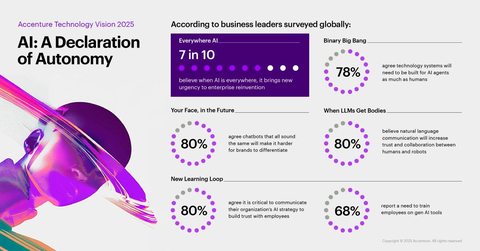Accenture Technology Vision 2025: New Age of AI to Bring Unprecedented Autonomy to Business
Twenty-fifth annual edition explores future as AI-powered autonomy takes shape and ripples across all dimensions of how an enterprise can reinvent technology development, customer experience, the physical world and global workforce

New research from Accenture finds a new era of digitization is unfolding—one in which AI continuously learns and drives new levels of autonomy across organizations, positioning trust in its performance as the most important measure organizations will need for AI to achieve its promise. (Graphic: Business Wire)
Now in its 25th year, the Accenture Technology Vision 2025 explores how the future is being shaped by AI-powered autonomy. As AI diffusion accelerates across the enterprise and society at a rate that is faster than any prior technology,
"Our 25th Technology Vision gives leaders a look into what’s ahead when AI continuously learns, acts autonomously with and on behalf of people, and pushes enterprises and the people who use it into new and exciting ways to continuously reinvent," said Julie Sweet, chair and CEO, Accenture. “But unlocking the benefits of AI will only be possible if leaders seize the opportunity to inject and develop trust in its performance and outcomes in a systematic manner so businesses and people can unlock AI’s incredible possibilities."
People’s trust in AI—beyond any technical aspect, that it performs justly and as expected—is essential to it having as broad and positive an impact as anticipated. This means digital systems and AI models are more accurate, predictable, consistent and traceable, over and above the responsible use of AI. Most (
The Accenture Technology Vision 2025 explores the potential impact of gen AI as it ripples across multiple dimensions, including technology development, customer experience, the physical world and the workforce:
- When foundation models cracked the natural language barrier, it kickstarted a shift that would forever change the fundamentals of software development and ecosystems. Already, gen AI coding assistants are elevating the role of developer to systems engineer, accelerating the democratization of code and digitization of businesses. The rise of custom systems as a result of gen AI assisted software development and the advancement of AI agents is igniting a shift from static application architecture to intention-based framework and agentic systems. As multi-agent systems become more capable, adaptive and personalized, it will inspire greater diffusion through enhanced competence, growing to manage processes and entire functions, from streamlining travel to optimizing inventory. For example, Accenture is enabling this future with its platforms, GenWizard, SynOps and AI Refinery, offering prebuilt industry agents and workflows to accelerate the time needed to build and see value from specialized multiagent systems.
-
Organizations are racing to make AI a new customer touch point but brands will only be able to achieve brand differentiation if the same focus is applied to AI experiences. While
80% of executives worry LLMs and chatbots could give every brand a similar voice,77% agree brands can solve by proactively building personified AI experiences and injecting distinct brand elements, such as culture, values and voice, into those experiences through its digital brain. - Generalist robots will emerge over the next decade, bringing more AI autonomy into the physical world. It will be possible for introductory general-purpose robots to become specialist robots, learning new tasks very quickly. Already, KION Group is teaming with Accenture and NVIDIA, to optimize how AI-driven robots perform warehouse tasks and seamlessly interact with and learn from warehouse staff to fulfill orders faster, safer and at a lower cost. Eighty percent of executives believe that robots collaborating with people and continuously learning from those interactions will increase trust and collaboration between people and robots.
-
People and AI are defining a virtuous learning loop: where the more people use AI, the more it improves, and the more people want to use it. Unlike conventional automation, which yielded one-time benefits, this new age of AI can enhance and advance its skills over time, improving its value to the individuals using it and the organization as a whole. A key priority (
80% ) for leaders is ensuring a positive relationship trajectory between people and AI—so it is not derailed by fears of automation—starting with communicating the strategy and bringing employees into the process. Accenture recently unveiled a Generative AI Scholars Program with Stanford Online to help clients sharpen gen AI knowledge and skills. In addition, organizations have the opportunity to equip every employee with a talented digital sidekick, one that will allow people to tap into new skills and grow use of gen AI tools. In turn, organizations will reap the benefit too, as individuals familiar with gen AI were found five-times more likely to have a positive perception of the technology.
The Technology Vision 2025 findings will be presented at CES 2025 on Jan. 7 from 2:00 – 2:40 p.m. PST during a livestreamed presentation at live.ces.tech.
About the Research
For 25 years, Accenture’s Technology Vision has taken a systematic look across the enterprise landscape to identify technology trends with the highest likelihood of disrupting businesses and industries. Input for the 2025 report was gathered from an external advisory board of more than two dozen experts spanning academia, business and the public sector. Primary global research included two parallel surveys: more than 4,000 executives across 21 industries and 28 countries, and more than 12,000 consumers fielded from Oct. to Dec. 2024. Learn more at accenture.com/technologyvision.
About Accenture
Accenture is a leading global professional services company that helps the world’s leading businesses, governments and other organizations build their digital core, optimize their operations, accelerate revenue growth and enhance citizen services—creating tangible value at speed and scale. We are a talent- and innovation-led company with 799,000 people serving clients in more than 120 countries. Technology is at the core of change today, and we are one of the world’s leaders in helping drive that change, with strong ecosystem relationships. We combine our strength in technology and leadership in cloud, data and AI with unmatched industry experience, functional expertise and global delivery capability. Our broad range of services, solutions and assets across Strategy & Consulting, Technology, Operations, Industry X and Song, together with our culture of shared success and commitment to creating 360° value, enable us to help our clients reinvent and build trusted, lasting relationships. We measure our success by the 360° value we create for our clients, each other, our shareholders, partners and communities. Visit us at accenture.com.
Copyright © 2025 Accenture. All rights reserved. Accenture and its logo are registered trademarks of Accenture.
View source version on businesswire.com: https://www.businesswire.com/news/home/20250106757872/en/
Jenn Francis
Accenture
+1 312 693 4411
jennifer.francis@accenture.com
Christian Harper
Accenture
+1 516 434 8615
christian.harper@accenture.com
Source: Accenture







